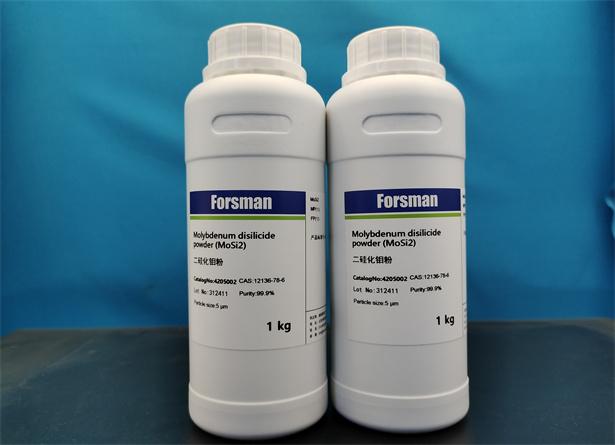Molybdenum silicide
Basic information
Molybdenum silicide is a kind of inorganic substance, which belongs to molybdenum silicon compound. The chemical formula is MoSi2 to prepare molybdenum silicide.
Molybdenum silicide is prepared by mechanical alloying, low vacuum plasma deposition, reactive synthesis, solid state replacement reaction, XDTM technology, etc., insoluble in most acids, but soluble in nitric acid and hydrofluoric acid. The radius of the two kinds of atoms is not much different, and the electronegativity is relatively close, which is similar to that of metals and ceramics. Molybdenum disilicide has electrical conductivity and a passivation layer of silicon dioxide can be formed on the surface at high temperature to prevent further oxidation.
Product description
Molybdenum silicide is a key material in high-tech fields, such as high-temperature anti-oxidation coating materials, electric heating elements, integrated electrode films, structural materials, reinforcers for composites, wear-resistant materials, bonding materials for structural ceramics and so on.
(1) Energy and chemical industry: electric heating elements, high temperature heat exchangers for atomic reactor installations, gas burners, high temperature thermocouples and their protective tubes, melting vessel crucibles (for smelting metals such as sodium, lithium, lead, bismuth, tin, etc.);
(2) Microelectronics industry: MoSi2 and other refractory metal silicide Ti5Si3, WSi2, TaSi2 are important candidate materials for large scale integrated circuit gate and interconnect films.
(3) Aerospace industry: as a high temperature oxidation resistance coating material, it has been widely and deeply studied and applied. Especially as materials for turbine engine components, such as blades, impellers, burners, tail nozzles and seals;
(4) Automotive industry: turbocharger rotors, valve bodies, spark plugs and engine parts for automotive turbochargers
Product parameters
|
The product name |
Molybdenum silicide |
Density |
6.31 g/cm³ |
Coefficient of thermal expansion |
8.1×10-6K-1 |
|
Molecular formula |
MoSi2 |
Melting point |
1930℃ |
Mohs hardness |
- |
|
Appearance form |
Gray metal powder |
Boiling point |
°Cat760mmHg |
Microhardness |
- |
|
CAS number |
12136-78-6 |
Resistivity |
21.5×10-6Ω·cm |
Storage mode |
Closed at room temperature, cool, ventilated and dry |
|
Molecular weight |
152.00 |
Electrical conductivity |
- |
- |
- |
At present, the factory can produce products of different particle sizes, such as nanometer level, submicron level, micron level and so on. The products that have been industrially produced are 0.2 μ m, 1-3 μ m, 5 μ m, 8 μ m and 500 μ m, all of which can be supplied at tonnage level and can be customized by customers with other granularities. The standard packaging specification is 1kg pr 25kg, which can be customized according to the quantity of materials put in by customers.
Further reading
The use of molybdenum silicide: MoSi2 is a kind of intermediate phase with the highest silicon content in Mo-Si binary alloy system, and it is a Dalton intermetallic compound with fixed composition. With the dual characteristics of metal and ceramic, it is a kind of high temperature material with excellent performance. It has good oxidation resistance at high temperature, the anti-oxidation temperature is above 1600 ℃, which is equivalent to that of SiC, and it shows metal-like soft plasticity above 1000 ℃. MoSi2 is mainly used as heating element, integrated circuit, high temperature oxidation resistance coating and high temperature structural material.
Related papers
[1] Ma Qin, Yang Yanqing. Application and prospect of molybdenum disilicide and its composites [J]. Material Guide, 1997, 11 (2): 4.
[2] Feng Peizhong, qu Xuanhui, du Xueli, et al. Research progress on oxidation resistance of molybdenum disilicide [J]. Powder Metallurgy Technology, 2006, 24 (001): 64-68.
[3] Li Junfeng, Luo Zhengping. Short-term high temperature structural evolution of tantalum silicide / molybdenum silicide based thermal protective coating [J]. Rare Metal Materials and Engineering process, 2020 Journal 49 (02): 712-717.
Product Showcase
Recommended product 1:Molybdenum silicide Product specifications 1-3μm
XRD spectrogram, SEM scanning electron microscopy, laser particle size
Recommended product 2: Molybdenum silicide particle size 0.8μm
Product test report: SEM scan electron microscopy
Product packaging

Product purchase Q&A
Q: We use it in the lab, do you have small packages?
A: Yes, for laboratory needs, we generally have 100g/250g/500g/1kg and other packaging specifications to meet the needs of laboratory research users.
Q: I see that some companies offer 99.9% of the products, why don't you have such high-purity products?
A: The purity of the product is determined by many factors such as raw materials, production processes, testing methods and other aspects of the product. Different detection methods for the same material, may vary greatly in purity. In addition to purity concerns, you need to understand what the purity test method is to determine the reliability of this purity. It is quite possible that the actual purity of a 98% purity product and a product of 99.9% purity is much the same.
